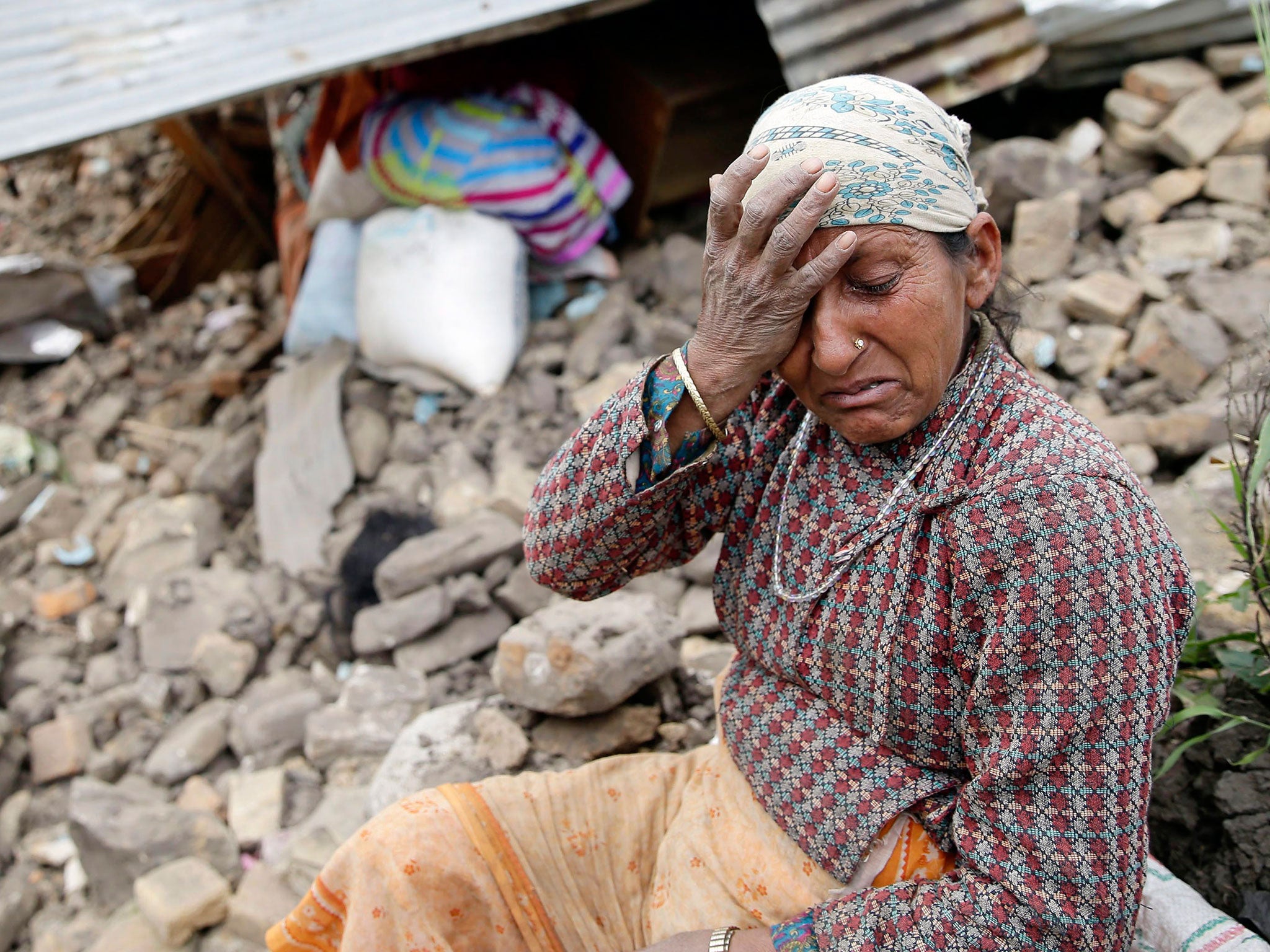Nepal earthquake eyewitness: Quake survivors in the tent cities of Kathmandu feel abandoned by the authorities
'Shops are closed. This is the last thing I have to eat. We're suffering'

The queues snake between green tarpaulin on what was once a military parade ground. Tundikhel park has become a makeshift refugee camp.
Such camps, or “evacuation centres”, have sprung up in public squares, parks and buildings in Kathmandu. The mood is grim. Many fear that another, even bigger, earthquake is coming. Others are sick. Nobody has enough food or water.
Less than half a mile away, at the Constituent Assembly building, the scene of political debate, hundreds of people take shelter. A crowd demands more food and water from police. There is not enough rice to eat.
Meanwhile, at a camp at Baneshwor, Kathmandu’s largest residential district, women prepare noodles for their children. “Shops are closed: this is the last thing I have to eat,” says Rama Sharma. “We are suffering.” Manoj Thapa, from the city of Pokhara, says he travelled to Kathmandu, seeking medical treatment. Now, however, he is living in the Baneshwor camp.
“Nobody has come to give us relief materials,” says Dhana Shrestha, who owns a home in the heart of Kathmandu but has been living inside a tent for two days. “We have heard and read news that so much foreign aid is pouring here,” a visibly angry Mr Shrestha adds. “If the government cannot provide the materials, why is it being called the government?”
At Tudikhel park, inside a green tent, Niranjan Mishra, 43, is playing cards with six friends. His wife and children pray quietly for the aftershocks to stop. They have been there since Saturday. “I am scared, I cannot go back to my flat, people are saying the earthquake will occur again,” Mr Mishra says. He hails from south-east Nepal and is getting constant calls from his parents to go back to their homes. It’s safer, they tell him.
“See, it’s very tough for us,” he says, holding empty water bottles outstretched. “No one has come to ask about our conditions.” Sima Lama remembers the earthquake hitting. “I was just completing my lunch and my house started trembling,” she says. “The roof above my kitchen started falling. I was helpless.” She does not know what happened to the rest of her family. “I do not have any idea what to do next,” says Binita, who lost her father. Nepal police say that more than 200 unidentified dead bodies are lying in hospitals in Kathmandu.
Kathmandu’s district chief administrator, Ek Narayan Aryal, said tents and water were being handed out at 10 locations in Kathmandu, but that aftershocks were leaving everyone jittery. “It’s overwhelming. It’s too much to think about,” said 55-year-old Bijay Nakarmi, mourning his parents, whose bodies were recovered from the rubble.
He could tell how they died from their injuries. His mother was electrocuted by a live wire on the roof top. His father was cut down by falling beams on the staircase. “We don’t feel safe at all. There have been so many aftershocks. It doesn’t stop,” said Rajendra Dhungana, 34, who spent Sunday with his niece’s family for her cremation at the Pashupatinath temple.
Nepal’s Chief Secretary, Leela Mani Poudyal, said: “We have been dealing with fresh challenges as our capacity has not been able to meet the overwhelming demands.”
Roads leading out of Kathmandu are jammed with people, some with babies, trying to climb on to buses or hitch a ride aboard cars and trucks to the plains. Huge queues formed at the city’s Tribhuvan International Airport, with tourists and residents desperate to get a flight out.
“I’m willing even to sell the gold I’m wearing to buy a ticket, but there is nothing available,” said Rama Bahadur, an Indian woman who works in Nepal’s capital. “We are escaping,” said Krishna Muktari, who runs a small grocery store in Kathmandu, standing at a major road intersection. “How can you live here?”
Additional reporting by Ishwar Rauniyar in Kathmandu
Join our commenting forum
Join thought-provoking conversations, follow other Independent readers and see their replies
Comments
Bookmark popover
Removed from bookmarks